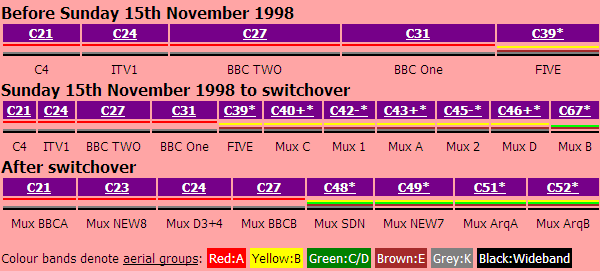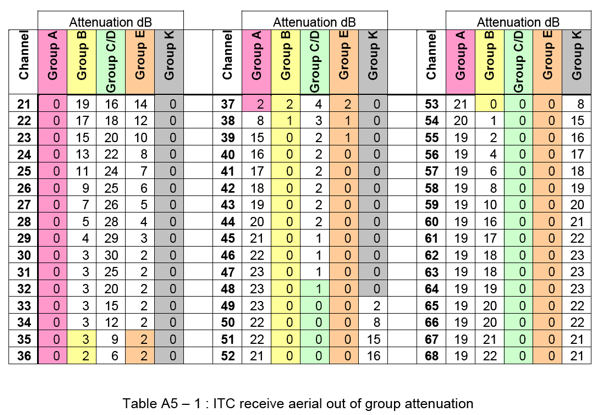Aerial groups - new feature
 Brian Butterworth published on UK Free TV
Brian Butterworth published on UK Free TV In the olden days of black and white, 405-line television, when the frequencies used were "very high" (VHF), the UK two-channel television service was provided using a just 100 transmitters and reception needed a standard aerial.
Later the system was upgraded to "ultra high frequencies" (UHF) for colour and now uses over 1,120 transmitters with more channels on more frequencies.
To enable the best quality reception possible, UHF television aerials are produced in a number of "groups". Each group is designed to operate on a range of channels, blocking all others. This is to prevent interference from "other" transmitters and to decrease losses on those required.
Each group is designated a colour, which is used to mark the aerial. Whilst wideband (black) aerials are designed to receive on all frequencies, their performance can be below a grouped aerial.
The transmitter pages now show a table like this:

The three sections show the three phases. The first is that before digital TV was introduced. This example shows that a group A (red) aerial would have received the original four channels but a group K was required to also receive FIVE. The channel number for FIVE on analogue is shown with an asterisk because it is "out of designated group", group A.
The second section shows the "digital with analogue" phase, where the transmitter has the analogue services from above with the new low power digital services. It can be clearly seen that on this transmitter a group A aerial will not receive any digital services at all, and that even a group K aerial will not receive the multiplex B service on C67. The only choice for digital reception here is a wideband (black) aerial because it is the only coloured band that crosses from left to right.
(You can also see that some of the digital services have plus and minus symbols. This indicates these transmissions use a 166.67kHz offset.)
The final section shows the designated frequencies that will be used for digital television after switchover. Whilst the public service multiplexes BBCA, BBCB, D3+4 are back "in group" (group A), to receive all the multiplexes, including the two potential new ones, the only choice here is wideband.
The performance of grouped aerials for each transmission channel was defined by the old Independent Television Commission (ITC) and is:

The larger the value, the lower the signal level possible.
7:10 PM
Edinburgh
Anybody any idea about Edinburgh? Blackhill or Craigkelly? Seems to depend on where you read it.
| link to this comment |
Andy's: mapA's Freeview map terrainA's terrain plot wavesA's frequency data A's Freeview Detailed Coverage
9:29 PM
Andy: Well, the trade predictor indicates Blackhill as being your No1 choice with good reception across the board being seen.
Craigkelly being the second best, but with the problem that only the first three Mux's are considered as being viewable, these covering the main BBC & ITV channels, including the HD one.
It should be said that although the predictor used is reasonably accurate local conditions can upset what is indicated as being possible, and in area's such as anywhere near Dalry Road or similar chimney mounting is really an essential for reliable reception, although a test with the aerial in the loft could be worth a try.
| link to this comment |
7:40 AM
Andy: Forgot to add to what was said re you including Edinburgh in the list, that there is a very low powered dual polarity fill in transmitter called Canongate (@ 2 miles from you) transmitting on channels 55-50-59, but its very doubtful if you would receive that in your location, and of course it isn't even mentioned as being a possibility on the trade predictor.
| link to this comment |
2:04 PM
Barnsley
Hi. My neighbour recently fitted a new external aerial to another neighbours house. At the same time as switch over the old lady swapped her rented tv for another rented tv, but this time one with built in Freeview. This is a Linsar 19LED504.
We live in Hoyland, Barnsley. Our post code is S74 9LR. The aerial that was fitted appears to be a wide band aerial, although I am not entirely sure. The elemants are vertical and it is pointing I believe at Sheffield(Crosspool). There is no line of sight. There is a hill lined with trees about 5 miles away from us and blocking the line of sight. Its is definatly not pointing at Emley Moor.
Anyway the lady's TV keeps getting pixelation and often drops channels, from memory she keeps losing ITV2 and some other non BBC Channels.
I have twice retuned the TV shortly after dropping channels and folling retune the tv finds the missing channels. Why would this be? At first I thought the problem may be co-channel interference. But not so sure now. I have wondered how crucial alignment is. This website says that we are 14 miles away from crosspool transmitter and I was wondering if because you can not see the transmitter to point the aerial at it, if this was the problem. But then why would it find the dropped channels after re-tuning?
Please Help
Many Thanks
| link to this comment |
Dean's: mapD's Freeview map terrainD's terrain plot wavesD's frequency data D's Freeview Detailed Coverage
5:31 PM
Dean Gerstel: You have to carry out a signal check (via tuning menu) to verify what station is being received, this done whilst on BBC1 noting the Mux channel associated with it, then change to ITV1 (ITV2 also on this Mux) and do similar.
If Sheffield (BBC1) Mux Ch 21 - (ITV1) Mux Ch24, whereas if its Emley Moor (BBC1) Mux Ch47 - (ITV1) Mux Ch44.
Unless there is some large obstruction between you and Emley Moor (@12mls) then Emley would appear as a better bet than Sheffield (@ 9mls) Emley Moor being massively more powerful.
Trees can be dastardly as far as reception is concerned, and if they are obstructing a transmitter that's on relatively low power anyway the more of an effect they will have, Sheffield being on 1Kw compared to Emley Moor on 174Kw.
By the way Emley is 308 Degrees - Sheffield being 201.
| link to this comment |
1:05 PM
Plymouth
I have changed from Ivybridge to Caradon Hill transmitter. Tuning the TV gives excellent reception on all channels (105 channels detected) EXCEPT the BBC channels.
The BBC chanels come up on the display, but say "no signal" When checking signal strength on ITV, it shows full strength, but when on BBC it shows nothing.
Any help on this would be appreiated.
| link to this comment |
IanP's: mapI's Freeview map terrainI's terrain plot wavesI's frequency data I's Freeview Detailed Coverage
IanP: Can you please, in the first instance, see the Single frequency interference | ukfree.tv - independent free digital TV advice page?
| link to this comment |
2:45 PM
Cinderford
Has anyone noticed how difficult it is to get hold of grouped aerials these days?
| link to this comment |
andrew's: mapA's Freeview map terrainA's terrain plot wavesA's frequency data A's Freeview Detailed Coverage
3:37 PM
Is there any planned increase in the number of freeview channels available at the Findon Meridian Transmitter?
| link to this comment |